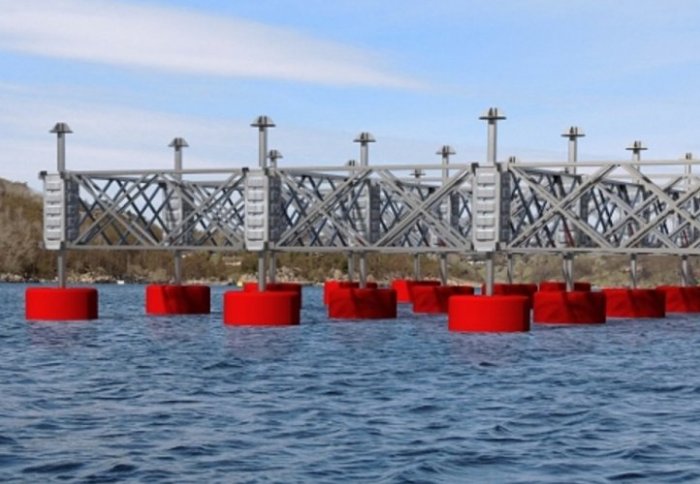Wave energy needs EU funds and innovation to deliver low-carbon power for UK

Illustration of a wave farm. Credit: SINN Power
Access to funding, a coherent long-term strategy and greater collaboration are required make wave power work for the UK, says a new report.
Wave energy could contribute significantly to the UK’s future energy mix, but only if the mistakes of the past are not repeated, say Imperial College London and Strathclyde University researchers in a report launched today.
Devices that sit on the sea surface can collect energy from passing waves as they bob up and down. Several designs have been tested, and wave power has long been heralded for its potential to play a central role in delivering low-carbon, secure energy for the UK.
Following the Paris climate agreement there is a critical need to improve our understanding of how to accelerate low-carbon energy innovation in the most effective manner possible.
– Professor Jim Skea
However, despite £200m of public funds being invested in research, development and demonstration (RD&D) since 2000 the technology has yet to reach commercialisation and be widely deployed in the UK.
In the report University of Strathclyde and Imperial College London researchers highlight key factors behind the failure of wave power technology to mature over the past 15 years, including poor understanding of the challenge, a policy landscape that failed to keep pace, lack of sharing between technology developers and lack of appropriate testing facilities.
However, they conclude lessons learned from this experience have led to a major reconfiguration of support for UK wave energy innovation, including the redesign of government RD&D programmes (e.g. Wave Energy Scotland), new networks of key stakeholders and the addition of new world-class test facilities (e.g. FloWaveTT).
The report’s authors say these changes mean the UK is much better placed to deliver a commercial wave energy device but warn success is threatened by wider political developments, not least Brexit and its impact on innovation funding and international collaboration.
Professor Jim Skea, Chair in Sustainable Energy in the Centre for Environmental Policy at Imperial College London, said: “Following the Paris climate agreement there is a critical need to improve our understanding of how to accelerate low-carbon energy innovation in the most effective manner possible.
“The report points towards two weaknesses in wave innovation that can be remedied: first the lack of convergence on a dominant design that has been the key to success for other renewable technologies and, second, fragmentation of support across many overlapping schemes.”
How to improve wave power support
The authors make ten policy recommendations to improve the effectiveness of the UK’s future support for wave energy innovation, including:
- Retaining access to EU research and development funding post-Brexit
- Developing a long-term wave energy strategy, especially for Scotland
- Improving coordination of research and development support within and across government
- Avoiding competition for subsidies with more established technologies, such as offshore wind and tidal stream
- Support the formation of niche market for wave energy deployment
Dr Matthew Hannon, Chancellor’s Fellow of Technology and Innovation in the Hunter Centre for Entrepreneurship at Strathclyde Business School, said: “The report’s findings are aimed primarily at government and industry in a bid to help improve the effectiveness of future wave energy innovation support in the UK and accelerate the technology’s journey towards commercialisation.”
The report was funded by the Engineering and Physical Sciences Research Council, Strathclyde Business School and the International Public Policy Institute.
Article supporters
Article text (excluding photos or graphics) © Imperial College London.
Photos and graphics subject to third party copyright used with permission or © Imperial College London.
Reporter
Hayley Dunning
Communications Division